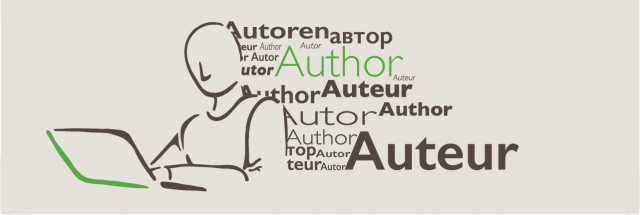 |
A new beginning and a message of forgiveness and reconciliation
A series of significant screenings and debates took place in Egypt, 27 May – 5 June, to mark the launch in the country of the Arabic version of the award-winning documentary film The Imam and the Pastor. The launch coincided with President Barack Obama’s visit to Egypt and his historic keynote speech at Cairo University on the relationship between the United States and the Muslim World. Imad Karam, who works with For the Love of Tomorrow films in the UK, and his wife Amira, report.
The Bibliotheca Alexandrina Library (the oldest library in the world in Egypt’s second city, Alexandria) hosted the first screening on the 27th of May in the presence of the film’s protagonists, Pastor James Wuye and Imam Muhammad Ashafa, and Co-Producer Dr Imad Karam. This city has special significance for Pastor James and Imam Ashafa; it was here that “The Alexandria Declaration” originated, which was later adapted by them to form the historic Kaduna Peace Declaration.
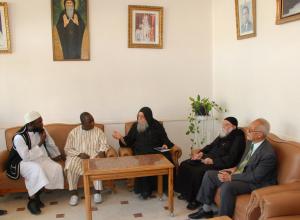
The event at the Bibliotheca was hosted by Moral-Rearmament Association-Egypt, the Institute for Peace Studies, the Arab Society for Reform and the Arab Dialogue Forum, and was followed by in-depth discussion with the 100 or so in the audience, many of whom are practitioners or specialists in the fields of peace studies and reconciliation.
Other key meetings while in Alexandria included meeting with the Alexandria Intercultural Dialogue Committee (previously known as the Muslim-Christian Dialogue Group) who shared their achievements, hopes and challenges as a multi-faith group in Egypt . The group invited Imam Ashafa and Pastor James to come back to Alexandria to deliver training to local leaders in peace building and reconciliation.
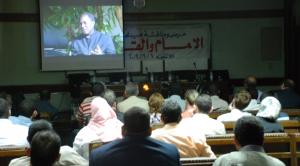 The team travelled on to Cairo. On the way, and in the middle of the desert, they paid a visit to the Monastery of St Macarius and had a couple of hours meeting with the two most senior monks, Father Basilius and Father Johnna Al-Makari.
The team travelled on to Cairo. On the way, and in the middle of the desert, they paid a visit to the Monastery of St Macarius and had a couple of hours meeting with the two most senior monks, Father Basilius and Father Johnna Al-Makari.
In Cairo, the first public screening of the film was organized by the Program for Civilization Studies and Dialogue of Cultures at Cairo University. The event, on June 1 was attended by local religious leaders, interfaith practitioners, the media, academics and students.
The following day, a high profile screening took place at the American University of Cairo. The Oriental Hall, which holds 300 people, was so packed that some people had to watch from outside the hall’s door.
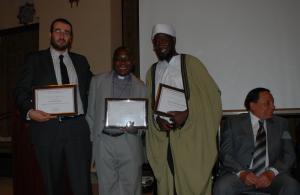
On the panel were Archbishop Michael Fiztgerald, Papal Nuncio to Egypt and the Arab League,; Adel Imam, one of the most popular actors in the Arab world and UN Goodwill Ambassador for refugees; Aly Elsamman, President of Egypt’s Interfaith Committee, Higher Islamic Council; and Dr Laila Tekla, President of the International Affairs Committee and the National Council for Human Rights.
The audience included members of parliament, former cabinet ministers, religious leaders, interfaith and peace advocates, the media, academics and members of the general public.
Following the questions and answers session, the Vice-Chancellor of the University gave an award from the university to the three guest speakers in acknowledgment for their peace work initiatives. The audience were then invited to a cultural evening and reception that allowed time for further interaction with the guests.
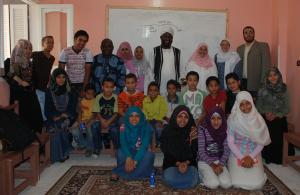
The next day, the group visited Ezbit Al-Hagana, a local project to help young people from the slums to have better education and housing. They also visited the Palestine Hospital, meeting Palestinians who were injured during the recent Israeli offensive on Gaza.
Imam Ashafa, Pastor James, and Dr Karam also had meetings with the President of Al-Azhar University and senior researchers at the Islamic Research Center, and were received by imams at the several mosques they visited.
The group was invited by Dr. Cornelis Hulsman, Director of the Centre for Intercultural Dialogue and Translation and Editor-in-Chief of Arab West Report to visit and meet with the team of the Arab West Understanding. The group listened to a presentation by one of team about the Muslim-Christian violence relating to a dispute over land rights at the Abu Fana Monastery in 2008, which they had been documenting. This was followed by questions directed to Ashafa and James about practical steps to conflict resolution.
Screenings of the film were hosted at the CultNat in the Smart Village (Egypt's premier model of Public-Private-Partnership) and at the Greater Cairo Library in collaboration with MRA Egypt.
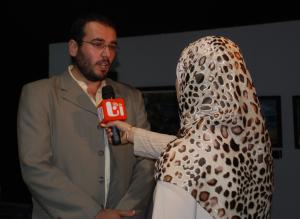 The final screening took place on Friday June 5 at Saqiat El Sawy, a youth cultural centre. The event, which was co-organized by Moral-Rearmament Association-Egypt and El Sawy Center, was sponsored by four local businesses. The 250-seat hall was filled with young and old people alike. Emphasizing the power of forgiveness, and that that differences of opinion can be a source of hope and strength, Imam Ashafa and Pastor James engaged in lively question and answer with their audience.
The final screening took place on Friday June 5 at Saqiat El Sawy, a youth cultural centre. The event, which was co-organized by Moral-Rearmament Association-Egypt and El Sawy Center, was sponsored by four local businesses. The 250-seat hall was filled with young and old people alike. Emphasizing the power of forgiveness, and that that differences of opinion can be a source of hope and strength, Imam Ashafa and Pastor James engaged in lively question and answer with their audience.
Media coverage during the visit included a live interview by one of Egypt’s most watched prime-time talk shows: Al-Hayyah Al-Yawm. The show included a screening of clips of the film. There was also TV coverage of some of the screenings by Orbit TV, OTV and Ana TV. The news of the visit was featured in most of Egypt’s dailies, including Al-Ahram daily, Al-Shorouk, Al-Wafd, Islam online, Rose al-Youssef, Egypt Today and several other online publications.
Egypt, the largest Arab country in terms of population, has had a long history of peaceful coexistence between Muslim and Christians; however, there have been some tensions over the last two decades which have not been addressed and which have sporadically erupted in violence.
Aware of the sensitivities in the Muslim-Christian relations debate, Imam Ashafa and Pastor James adopted a humble approach to communicate their message. At the different screenings, they shared with their audience that they were carrying a message of forgiveness and reconciliation. They recognized that Egypt was a cradle of civilization and a connecting point of cultures; they emphasized that they were in Egypt to learn about the Egyptian experience of coexistence and to share their own. They said that their visit was ‘a catalyst for a greater Egyptian Nigerian peace collaboration’ and that ‘Egypt could offer a helping hand to the other African nations and beyond’.
Their Egyptian audiences responded positively, acknowledging pride in the Egyptian model of coexistence, while also recognizing that there is a need to engage grass-roots people in dialogue, and to enhance capacity in existing structures on intercultural dialogue.

